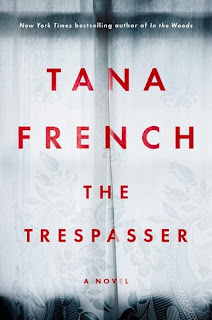Rating: 5/5
Review:
A readable, thought-provoking book
I thought this was a very good book. It is very readable, Mark Lawson is a very
acute observer of modern society and he raises important issues.
The story is of two colleagues in the History Department
(now "Directorate") of a fictitious University. One is accused by the institution of Bullying
and Insubordination, while another is investigated by the police because of an
historical accusation of rape. The way
in which these two things are handled and their effect on those involved is
very well done. Cleverly, neither
character is particularly likeable, and one has behaved very sordidly in the
past, which lends the story greater weight.
It is intercut with one character reading the literature of false
accusation – Kafka, Böll, Miller and others – and their respective situations
are well compared and contrasted with it.
It is hard to say much about the plot itself without giving
away more than I would like to have known before starting the book, but the
university's investigation into Bullying ("The Process") is wittily
but chillingly depicted. Lawson is
especially good on the use of language; complainants being automatically
designated as "victims" before any investigation, for example, or the
evolution of departmental title from Personnel to Human Resources to People to
Workplace Harmony. This is a world (all
too familiar) in which wit, irony, nuance or complexity are utterly
unrecognised, and debate or criticism are readily designated as
"bullying." Lawson gets the
use of management-speak very acutely in the way in which, like Owell's
Newspeak, it is designed to make any dissenting thought (and sometimes any
thought at all) impossible – and what happens when an academic institution
defines itself as a "business" in pursuit of "customers"
who must be satisfied. The Process is tellingly
described by a character from Workplace Harmony as "robust…fit for
purpose," but by another academic as "processes as questionable to
the humane as they are apparently unquestioned by the mob." Lawson points out that just as it is
unacceptable to dismiss dreadful harassment and genuine bullying as
"banter," it is also possible to misuse the term "bullying"
to suppress any debate or inconvenient truth-telling.
The plot surrounding the rape allegations is more
problematic. This is bound to provoke
dispute and I see that the excellent Roman Clodia , whose views I respect
greatly, says in her review that she was made angry by Lawson's approach. I wasn't – but then I'm acutely aware here
that I'm not female. However, I do think
it's legitimate to raise the issue. Rape
is among the vilest and most damaging of crimes, so does widening its
definition to such an extent unfairly brand people as rapists, and ultimately
weaken the dreadfulness of the crime in the public mind?
I don't mean to turn this into an essay, so I'll stop. As a novel, I think this is readable, witty
in places, very serious in others and raises important issues. It is perhaps a little over-long, but I still
found it engrossing right up to the end and I can recommend it warmly.
(I received an ARC via Netgalley.)





